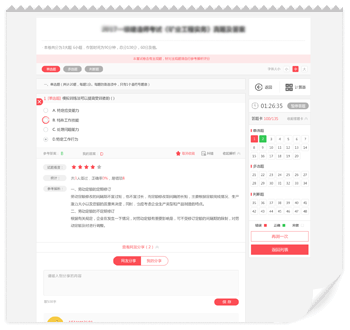- 年份:2025年
- 类型:模拟试题
- 总分:100.00分
- 时长:180分钟
- 题量:48
- 做题人数:0人
做题

手机在线做题

-
Many Americans have been feeding a baby aspirin once a day, believing it would protect them from a heart attack, a stroke,and even cancer.But several recent studies have 1______this into question.
One large-scale study 2______more than 19,000 healthy people ages 65 and older.Participants were 3______assigned to take either 100 mg of aspirin (slightly more than the 81 mg dose that 4______people take) or a placebo (aharmless substance given to a sick person 5______medicine, without telling them it is not real) every day for an average of 4.7 years. 6______did people in the aspirin group not 7______their risk of heart disease,dementia, or disability, but they were also more 8______to suffer from significant bleeding in the digestive tract or brain.And they were more likely to die 9______, apparently because of an increased risk of 10______cancer.
11______, a trial of more than 12,500 people ages 55 and older 12______to have a moderate cardiovascular risk found no benefit to taking aspirin daily.In a study of more than 15,000 people with diabetes, a daily aspirin did 13______heart attacks and strokes, but it also 14______major bleeding.And according to an analysis of data from more than 117,000 people, 15______people needed larger doses of aspirin to help 16______their risk of heart attack, stroke, and cancer.
The bottom line: Although there is good 17______that aspirin can help people who have already had or are at 18______risk for heart attacks or strokes, the drug’s 19______is not so clear for people,especially older people, with less risk. 20______your doctor before starting—or stopping—aspirin.
【正确答案-参考解析】:参加考试可见
-
Everyone wants to be authentic.You want to be true to yourself, not a slavish follower of social expectations.You want to "live your best life," pursuing your particular desires,rather than falling in line with whatever everyone else thinks happiness requires.Studies have even shown that feelings of authenticity can go hand in hand with numerous psychological and social benefits: higher self-esteem, greater well-being, better romantic relationships and enhanced work performance.
Although most people would define authenticity as acting in accordance with your own set of values and qualities,research has shown that people feel most authentic when they conform to a particular set of socially approved qualities, such as being extroverted, emotionally stable, conscientious, intellectual and agreeable.This is the paradox of authenticity: In order to reap the many of the benefits of feeling authentic, you may have to betray your true nature.
From a psychological science standpoint, a person is considered authentic if he or she meets certain criteria.Authentic people have considerable self-knowledge and are motivated to learn more about themselves.They are equally interested in understanding their strengths and weaknesses, and they are willing to honestly reflect on feedback regardless of whether it is flattering or unflattering.Above all, authentic people behave in line with their unique values and qualities even if those characteristics may conflict with social conventions or other external influences.
But a number of studies have shown that people’s feelings of authenticity are often shaped by something other than their loyalty to their unique qualities.Paradoxically, feelings of authenticity seem to be related to a kind of social conformity.The research also finds that people report feeling most authentic when their behavior confirms to a specific pattern of qualities: namely, when they are extroverted, emotionally stable,conscientious, intellectual and agreeable.
So, when it comes time to actually make a judgment about our own authenticity, we may use criteria that are closer to how we judge the authenticity of an object such as food.A fruit tiramisu may be unique, but the authenticity of tiramisu is judged by its conformity to a conventional recipe.Similarly, it appears that the more we conform to social conventions about how a person should act, the more authentic we feel.
We want to believe that authenticity will bring us benefits.It’s not surprising that businesses such as Microsoft, BlueCross BlueShield, and Gap have worked with consultants to leverage authenticity in the workplace. However, until we learn more about whether being authentic reaps the same benefits as feeling authentic, we are left with a tough decision between loyalty to our true selves and conformity to social convention.
【正确答案-参考解析】:参加考试可见
-
It’s familiar enough to be a cliche: the loyal worker who finally retires and then is flummoxed by the prospect of filling unoccupied days. For people whose sense of purpose is wrapped up in their professional identities, life without work is only a pale version of life.
Andrew Yang, currently a US Democratic presidential candidate and also the founder of job-creation nonprofit " Venture for America", expresses some of the common fears about worklessness when he says:" It’s clear from the data, and common sense, and human experience, that many, many people struggle without work. We’re idle men; we volunteer less, even though we have more time. And over time, we tend to play a lot of video games, and drink more. Society generally fares very poorly without work."
Yet it isn’t universally accepted that paid employment is key to an active life. The Japanese concept of ikigai ( the reason for being alive) expresses happiness in life. Among Japanese women and men surveyed in 2010, fewer than one-third equated work with their ikigai.Hobbies, relationships and unpaid work—all of these can add up to a richly meaningful life, one where "retirement" might be a foreign concept.
On the other hand, for many people in precarious employment, on low wages or with limited retirement savings, worrying about purpose outside work may be an unaffordable luxury. Many people simply can’t afford to retire early or shorten their work weeks. For those who are forced to work less without corresponding public assistance, "leisure time" is likely to be an illusion as they frantically search for ways to supplement their main income.
But the automation of work, awareness of the environmental impact of work and the growing movement for shorter work weeks mean that many of us are likely to be working less in the future. It may be that with less work to go around, boredom will increase, at least initially. But this will have its upsides. More recreational time baked into a week might keep us from feeling like we need to frantically fill every moment.
At the moment women, especially, tend to be chronically overworked, but much of that "work" isn’t valued the way paid employment is. Looking after the kids, tending to ageing parents, and handling domestic, social and community responsibilities all take up many hours. Reducing the burden of work might free up time or energy for the unpaid care. Challenging as it can be, allowing women to be relaxed has benefits for their creativity and wellbeing.
The shorter-week trials that have been conducted suggest that workers with longer weekends used their extra time for a mix of activities. For a New Zealand financial services firm that last year gave employees the option of a four-day working week, this included more employee time spent golfing, watching Netflix, studying and spending time with family. For a UK PR firm that also instituted a four-day week, one young employee started spending her extra time volunteering with elderly people.

A.they are more likely to have more inventive and innovative ideas
B.there are more significant things to do apart from work
C.life filled with work is desirable
D.workers with longer weekends use their extra time for a variety of activities
E.spending less time on work can do harm to social prosperity
F.they need to find new ways to make more money
G.many people are likely to be working less in the future
【正确答案-参考解析】:参加考试可见
-
Pursuing perfection in your work may seem like a noble pursuit. After all, many would attribute at least part of Steve Jobs’ legacy to his incredible attention to detail and refusal to accept anything short of perfection. Perfectionism may have served Jobs well at times, but for the average professional, a tireless drive for perfection can create significant inefficiencies.
Perfection is deceptive. It’s like trying to climb a mountain that has no summit. You never know if you’ve achieved it. The goal is not to deliver something perfect but to deliver something that has impact. Perfectionism creates psychological barriers to getting work done and causes you to spend time on work that has little impact.
Perfectionism is not a bad mentality at its core. You likely seek perfection because you want to do great work and have an outsized impact on the world around you. But, don’t let perfection deceive you into making it the primary goal. Instead, ask yourself, "What’s the minimum amount of work I can do to create the greatest impact?" Then you’ll achieve much more than you are today and avoid the psychological burden of pursuing an unattainable goal.
【正确答案-参考解析】:参加考试可见
-
Directions:
Suppose you are preparing for CET-6 and needing some reference books.Write an email to the sales department of a bookstore,
1) ask for the detailed information about the books you need, and
2) express your gratitude.
You should write about 100 words on the ANSWER SHEET.
Do not sign your own name at the end of the email.Use "Li Ming" instead.(10 points)
【正确答案-参考解析】:参加考试可见
-
Directions:
The chart below shows the aid from six developed countries to developing countries from 2016 to 2018.In your writing, you should summarize the information by selecting and reporting the main features and make comparisons where relevant.You should write about 150 words on the ANSWER SHEET.( 15 points)

【正确答案-参考解析】:参加考试可见

 切换考试
切换考试
